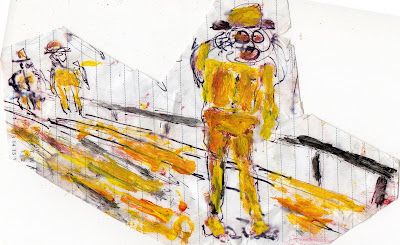







Nietzche writes, "What if some day or night a demon were to steal after you into your loneliest loneliness and say to you, `This life as you now live it and have lived it, you will have to live once more and innumerable times more; and there will be nothing new in it, but every pain and every joy and every thought and sigh and everything unutterably small or great in your life will have to return to you, all in the same succession and sequence - even this spider and this moon-light between the trees, and even this moment and I myself. The eternal hourglass of existence is turned upside down again and again, and you with it, speck of dust.
Nietzche writes, "What if some day or night a demon were to steal after you into your loneliest loneliness and say to you, `This life as you now live it and have lived it, you will have to live once more and innumerable times more; and there will be nothing new in it, but every pain and every joy and every thought and sigh and everything unutterably small or great in your life will have to return to you, all in the same succession and sequence - even this spider and this moon-light between the trees, and even this moment and I myself. The eternal hourglass of existence is turned upside down again and again, and you with it, speck of dust.
"Would you not throw yourself down and gnash your teeth and curse the demon who spoke thus? Or have you once experienced a tremendous moment when you would have answered him, `You are a God and never have I heard anything more divine!
"Would you not throw yourself down and gnash your teeth and curse the demon who spoke thus? Or have you once experienced a tremendous moment when you would have answered him, `You are a God and never have I heard anything more divine!
*Walter Kaufmann suggests that Nietzsche may have encountered this idea in the works of Heinrich Heine, who once wrote:
Time is infinite, but the things in time, the concrete bodies, are finite. They may indeed disperse into the smallest particles; but these particles, the atoms, have their determinate numbers, and the numbers of the configurations which, all of themselves, are formed out of them is also determinate. Now, however long a time may pass, according to the eternal laws governing the combinations of this eternal play of repetition, all configurations which have previously existed on this earth must yet meet, attract, repulse, kiss, and corrupt each other again.
Eternal return (also known as "eternal recurrence") is a concept which posits that the universe has been recurring, and will continue to recur, in a self-similar form an infinite number of times across infinite time and/or infinite space. The concept initially inherent in Indian philosophy was later found in ancient Egypt, and was subsequently taken up by the Pythagoreans and Stoics. With the decline of antiquity and the spread of Christianity, the concept fell into disuse in the western world, though Friedrich Nietzsche resurrected it.
(* A purely physical concept, involving no supernatural reincarnation.)
 The basic premise is that the universe is limited in extent and contains a finite amount of matter, while time is viewed as being infinite. The universe has no starting or ending state, while the matter comprising it is constantly changing its state. The number of possible changes is finite, and so sooner or later this entails the same return of beings in the same bodies
The basic premise is that the universe is limited in extent and contains a finite amount of matter, while time is viewed as being infinite. The universe has no starting or ending state, while the matter comprising it is constantly changing its state. The number of possible changes is finite, and so sooner or later this entails the same return of beings in the same bodiesPainting by Bosco Redmond
No comments:
Post a Comment